Visiting Scholar at the University of New Mexico, Albuquerque, USA: An Inspiring Experience
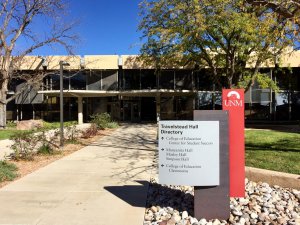
In this report by visiting scholar Reinhard Bauer, University College of Teacher Education Vienna (PH Wien), Department for Interdisciplinary Education (IBS), Center for Educational Technology and Innovation (ZLI), he reports on his exciting, inspiring and informative trip across the Atlantic Ocean to the University of New Mexico (UNM) from October 22th to October 26th, 2018.
The purpose of my stay was to intensify the links between the PH Wien and the UNM, especially the UNM College of Education (COE), in order to plan further steps of cooperation between the two institutions. To this end, I met with a large number of the UNM staff. In a general sense, it was a unique combination of science, technology, business, and art, i.e., a kind of “short-term holistic brain inspiration”.

A view from the top: the Sandia Mountains in Albuquerque (Photo: Reinhard Bauer)
In my one-week visit to UNM I met my hosts Dr. Deborah Rifenbary, Associate Dean for Academic Affairs & Faculty Development and coordinator of the Stars Assistant Program, and Dr. Paul Edmunds, Director of the Center for English Language & American Culture (CELAC), with whom I had very exciting discussions on international student exchange programs, foreign language learning, and the role educational technology plays on both issues. We also discussed possible lines of research and publication concerning the Stars Program.
- UNM School of Education (Photo: Reinhard Bauer)
- UNM Student Union Building (SUB) (Photo: Reinhard Bauer)
- Zimmerman Library (Photo: Reinhard Bauer)
On Monday, October 22, during my Spanish lecture at the UNM Language Learning Center (LLC) about the use of educational patterns of action for the development of digital portfolios, I presented and discussed Christopher Alexander’s pattern approach, and its usefulness in the field of education. I also had the opportunity to talk about my most recent work in the EU-funded project “PREPARE” (Promoting reflective practice in the training of teachers using e-portfolios), which aims at finding an innovative solution to the problem of the simple lack of awareness concerning the promotion of individual learners. Bearing the objective of my lecture in mind, I focused on presenting examples and exercises concerning the work on the PrepareCampus that consists of a digital learning environment including an annotation platform for video analysis (edubreak®) and an e-portfolio application (Mahara). I explained how this learning environment is used in the practical training of student teachers. In this context, social video learning, i.e., the use of the video platform edubreak® that enables student teachers to watch and comment on their lessons in a timestamp-based way and, subsequently, to analyze their professional experience on the basis of peer and expert feedback, evoked great interest.
In order to gain more insight into the use of educational technology in New Mexican classrooms, on Monday evening, I visited Dr. Karla Kingsley’s course on “Digital Game-Based Learning”. She is associate professor of elementary education at the Teacher Education Department of the UNM. Her course focuses on educational video games and game play for active, critical, interdisciplinary learning, something which can happen in school or out of school. The course participants, PhD and master’s students who are working as teachers in secondary schools, examine a variety of perspectives on what it means to learn, how learning is assessed, and the way digital games can effectively address the needs of diverse learners, and learners with special needs. After short presentations, Dr. Kingsley, their students and I had a wide-ranging discussion about the use of educational technology in the classroom.
During this academic exchange, on Tuesday, October 23, I also met with Dr. Anne Campton, Associate Director of the Center for Academic Program Support (CAPS), who is interested in higher education learning centers as places that promote social justice and equity in education, and Dr. Kimberly A. Fournier, Associate Director for the Center for Teaching Excellence (CTE), who has experience implementing numerous pedagogical techniques aimed at promoting meaningful learning (flipped classroom, active learning activities, metacognitive reflection) and innovative assessments (collaborative, two-stage exams) in a large enrollment, high-risk course. These meetings were particularly fruitful as I gained a lot of insight about the inner workings of CAPS, an award-winning learning assistance program available to all UNM students enrolled in undergraduate classes, and CTE, that supports faculty as they cultivate engagement, equity, and learning in their classrooms.
During my stay in Albuquerque I was also in contact with Dr. Salvador Hector Ochoa, Dean of the UNM College of Education, Linda Melville, Director of International Student and Scholar Services at the UNM, and Dr. Nicole Tami, Executive Director of Global Education Initiatives.
On Wednesday, October 24, I had the opportunity to speak with Vanessa Vander Galien and Bart Hill, members of the CELAC Academic Team. This meeting explicitly focused on the work of CELAC, one of the most affordable ESL options offered at a U.S. university that provides top quality English language training for students in both academic and professional settings.
On Thursday, October 25, I met Dr. Trenia L. Walker, Chair of the Department of Teacher Education, Educational Leadership & Policy (TEELP), who was one of the Texas Tech Fulbright Scholars during the 2013-2014 year at the University of Pristina in Kosovo (cf. Blog) conducting research and teaching. Her research focuses on the ways teachers and administrators use data to promote decision making and its effectiveness. Dr. Walker and I had an interesting discussion on how to use educational technology in class for teaching and learning activities, how educational technology changes learning and teaching activities as well as distance education. We found out that we share a number of interests, especially our vision on how teachers should improve their quality of both theory and practice in the field of educational technology.
On Thursday afternoon, I had a visit to La Mesa Elementary School, a multilingual (English, Spanish, Navajo, Swahili, among others) community school in Albuquerque that serves approximately 750 students in grades Prekindergarten to 5th. La Mesa Elementary is in partnership with the University of New Mexico’s TECLA program – Teacher Education Collaborative in Language Diversity and Arts Integration. The goal of this partnership is to incorporate art and literature into every aspect of the curriculum without sacrificing any common core learning. On our arrival, Dr. Rifenbary and I listend to the La Mesa Pop Choir. Conceptualized and directed by Dr. Leila Flores-Dueñas, associate professor of elementary education at the Teacher Education Department of the UNM, La Mesa Pop Choir was created to foster language, literacy learning, and to create a space for personal introspection and expression.
- La Mesa Elementary School, Albuquerque (Photo: Reinhard Bauer)
- La Mesa Pop Choir (Photo: Reinhard Bauer)
- Bring a Book to Life, Phase I (Photo: Reinhard Bauer)
- Bring a Book to Life, Phase I (Photo: Reinhard Bauer)
- Bring a Book to Life, Phase I, La Mesa Courtyard Mural (Photo: Reinhard Bauer)
- New TECLA Project (Photo: Reinhard Bauer)
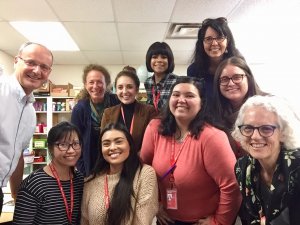
Reinhard Bauer, Teacher Students, Amy Sweet, Dr. Rebecca Sánchez, Dr. Eileen Waldschmidt
Dr. Rebecca Sánchez, Associate Professor in Teacher Education and Educational Leadership and Policy, is a TECLA coordinator at the COE. She explained the project “Bring a Book to Life Performance and Mural” to Dr. Rifenbary and me. In this project the students explored the theme of migration. Therefore TECLA faculty collaborated with classroom teachers and curated a library of 50 books addressing migration. During professional development experiences, cooperating teachers worked with their student teachers to select a book. The book became central to design a tile mosaic mural. Dr. Sánchez stated that for students, these murals are more than what meets the eye. Behind each individual piece are images that represent personal experiences, struggles within the community and history lessons on issues like slavery and immigration. You just have to see the murals that decorate the courtyard of La Mesa Elementary: They are gorgeous!
After our visit to the murals, I met a group of student teachers and their professors Amy Sweet (arts educator) and Dr. Eileen Waldschmidt. We had interesting discussions on media literacy, the importance of personal reflection, and the use of electronic portfolios, among other topics. The teacher students told me that – in keeping with the principles of performance-based assessment – they create their own websites to collect evidence of their best work in the TECLA program.
On Friday, October 26, Grandon Goertz, a CELAC fellow and I had a one-day trip to Santa Fe, the capital and cultural center of New Mexico, and to the Sandia Mountains. We travelled there by car from Albuquerque. It was a very pleasant experience.
- Santa Fe Plaza (Photo: Reinhard Bauer)
- Earth-colored building made of adobe bricks, Santa Fe (Photo: Reinhard Bauer)
- Canyon Road, art district in Santa Fe (Photo: Reinhard Bauer)
Overall, my time as visiting scholar was very fruitful as I could meet relevant professionals and inspiring scholars, with whom I engaged in revealing conversations about educational patterns, digital portfolios, social video learning, and the general role of educational technology in teaching, and the need to promote, research and teach its methods.
I want to thank the faculty of the UNM College of Education (COE) and the Center for English Language & American Culture (CELAC) of the University of New Mexico, especially Dr. Deborah Rifenbary and Dr. Paul Edmunds for their very warm welcome and the inspiring visit. I am also very grateful to the International Office of the University College of Teacher Education Vienna for giving me the opportunity to visit the UNM, especially Renate Hanisch, Stars Assistant Program Coordinator of the Austrian-American Educational Cooperation Association (AAECA), and Dr. Thomas Bauer, PH Wien, Head of the International Office.
For more information, please visit
- The University of New Mexico, Albuquerque, USA
- UNM College of Education (COE)
- Center for English Language & American Culture (CELAC)
- Global Education Office (GEO)
- Department of Teacher Education, Educational Leadership & Policy (TEELP)
- Center for Academic Program Support (CAPS)
- The University of New Mexico – College of Education’s TECLA Project
- Austrian-American Educational Cooperation Association (AAECA)
Reinhard Bauer, University College of Teacher Education Vienna, November 3rd, 2018
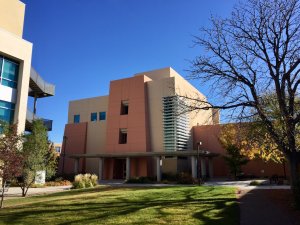
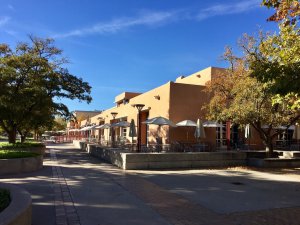
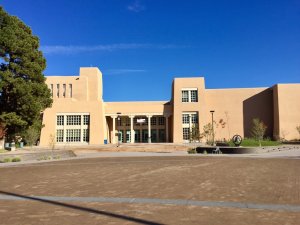
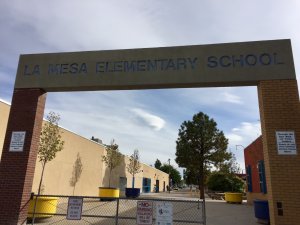
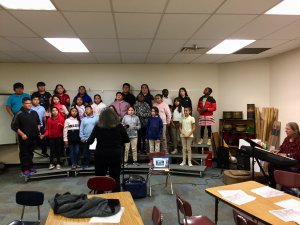
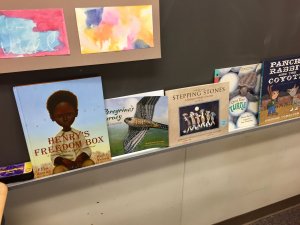
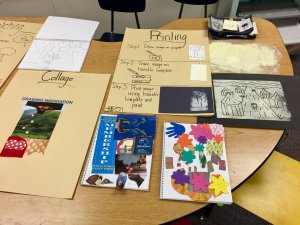
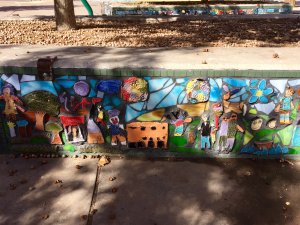
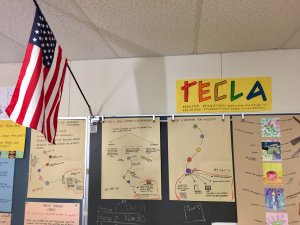
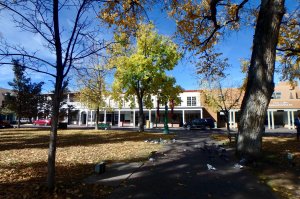
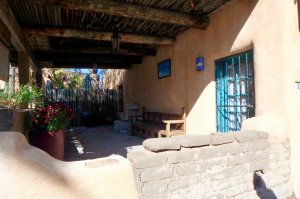
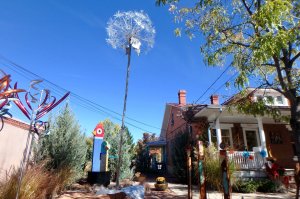
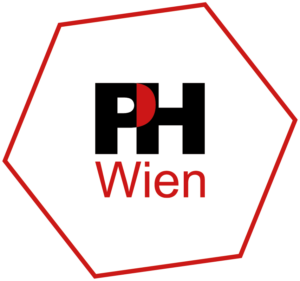
[…] For more information see here. […]